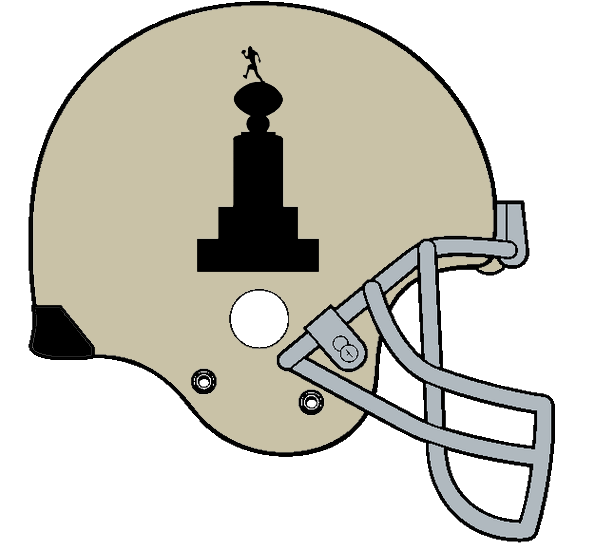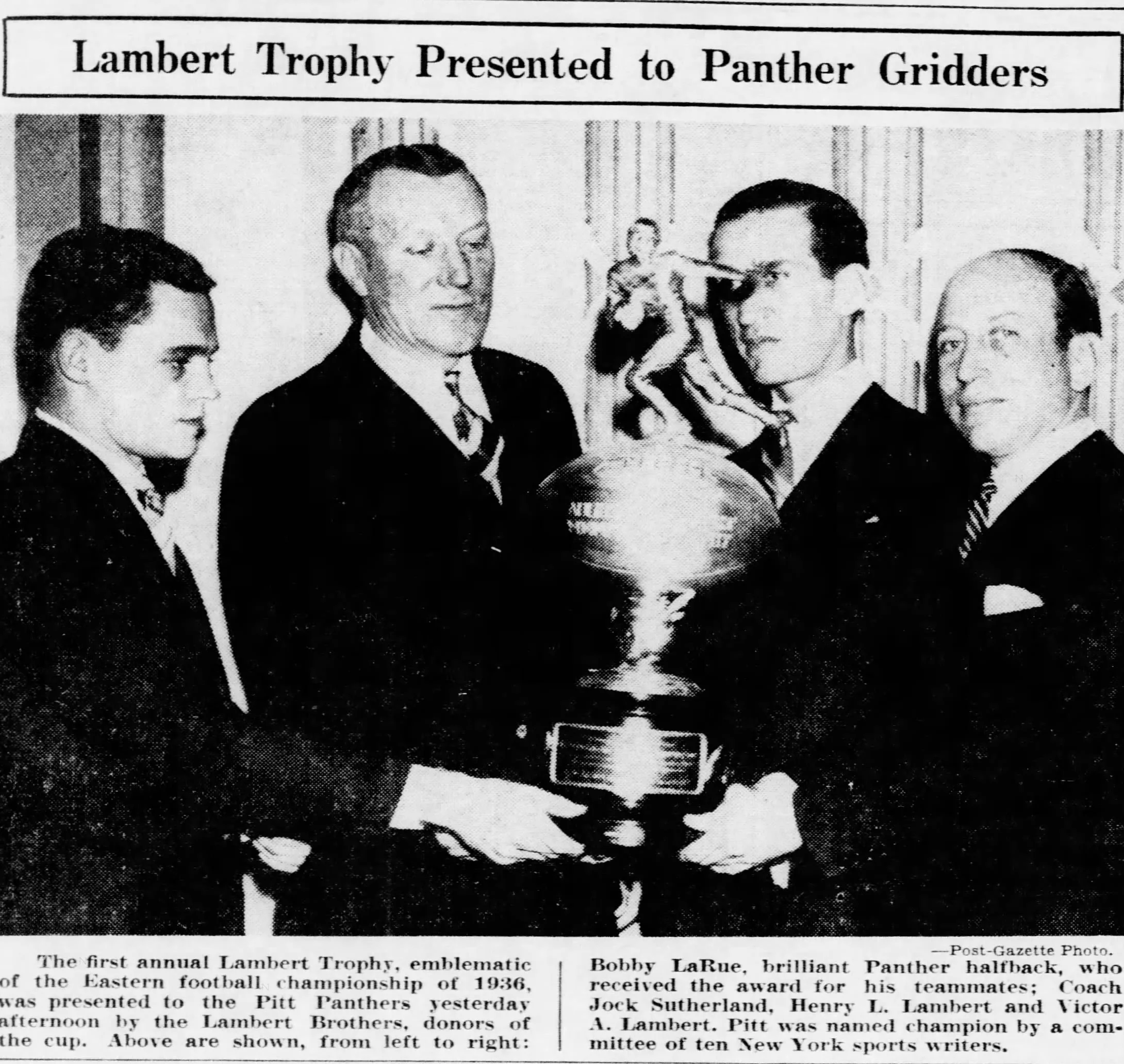1936 Pittsburgh Panthers Football: The First Lambert Trophy Season
Season Overview
The 1936 Pittsburgh Panthers football team delivered a season to remember, earning the inaugural Lambert Trophy as the best team in Eastern college football and cementing their legacy with a national championship. Under the legendary guidance of Coach Jock Sutherland, the Panthers navigated a challenging schedule to finish 8–1–1, culminating in a Rose Bowl victory over Washington on January 1, 1937. This marked Pitt’s first Rose Bowl win, solidifying their position as one of the nation’s elite teams.
Pitt’s 1936 season was defined by an impenetrable defense and a knack for excelling in high-stakes matchups. Despite a rare loss to Duquesne and a scoreless tie against Fordham, the Panthers claimed signature victories over No. 7 Notre Dame, Penn State, and No. 6 Nebraska. Their dominant 21–0 win against Washington in the Rose Bowl capped a triumphant season, showcasing their prowess on a national stage.
Pittsburgh’s exceptional performance earned them recognition as national champions by several selectors, as well as the inaugural Lambert Trophy, cementing their status as the best team in Eastern football. The Lambert Trophy win not only validated their season but also played a pivotal role in their selection for the Rose Bowl. In those days, the West’s representative (Washington, as Pacific Coast Conference champions) was responsible for choosing their opponent.
While teams such as Alabama and Louisiana State were available and strong contenders, Washington selected Pittsburgh—a decision directly influenced by the Panthers’ Lambert Trophy recognition. Washington Athletic Director Ray Eckmann remarked:
"Our intent has been to choose the team which is representative of the best in eastern football. Many sections have turned out splendid teams this year, any one of which might have made an acceptable opponent. Yet the unusually strong schedule which confronted Pittsburg and the outstanding record it made, ending the season with a definite display of superiority, makes it the logical opponent to represent the east in this game. The further fact, that this week 10 of New York City's sports writers chose Pittsburg as the winner of the Lambert Memorial Trophy...has confirmed our judgement."
Game-by-Game Recap
September 26, 1936: Pitt 53, Ohio Wesleyan 0
The Panthers opened the season with a dominant 53–0 victory over Ohio Wesleyan, scoring eight touchdowns behind Marshall Goldberg’s 208 rushing yards and two touchdowns. Pitt’s defense allowed just 44 yards and two first downs in a one-sided performance.
October 3, 1936: Pitt 34, West Virginia 0
Pitt shut out rival West Virginia, 34–0, extending their winning streak in the series to eight games. Leo Malarkey’s three touchdowns led the offense, while the defense stifled the Mountaineers throughout the game.
October 10, 1936: Pitt 6, Ohio State 0
In a defensive slugfest, Harold Stebbins’ 35-yard touchdown run in the fourth quarter secured a 6–0 victory on the road over Ohio State. The Panthers dominated yardage 243–75, holding the Buckeyes to just five first downs.
October 17, 1936: Duquesne 7, Pitt 0
The Panthers suffered their first loss in eight seasons to city rival Duquesne. George Matsik’s 72-yard touchdown run proved to be the difference in a rainy, hard-fought contest.
October 24, 1936: Pitt 26, No. 7 Notre Dame 0
Pitt rebounded with a 26–0 thrashing of No. 7 Notre Dame, earning 15 first downs and 399 total yards. The defense held the Irish to 90 yards in what was Notre Dame’s worst loss in over a decade.
October 31, 1936: Pitt 0, No. 5 Fordham 0
Pitt battled to a scoreless tie against Fordham in a game defined by strong defenses and missed opportunities. The Panthers advanced deep into Fordham territory twice but failed to convert on fourth downs.
November 7, 1936: Pitt 34, Penn State 7
The Panthers routed Penn State, 34–7, scoring three fourth-quarter touchdowns to seal the win. Harold Stebbins and Johnny Wood each had long touchdown runs to highlight Pitt’s offensive dominance.
November 14, 1936: Pitt 19, No. 6 Nebraska 6
Arnold Greene’s two touchdowns led Pitt to a 19–6 road victory over Nebraska, securing their reputation as a tough out on the road. The Panthers controlled the game with 22 first downs and 344 total yards to Nebraska’s 6 and 113, respectively.
November 26, 1936: Pitt 31, Carnegie Tech 14
Marshall Goldberg scored three touchdowns as Pitt defeated Carnegie Tech, 31–14, in their final regular-season game. The Panthers built a 17–0 lead before icing the game with Goldberg’s 87-yard kickoff return for a touchdown.
January 1, 1937: Pitt 21, No. 5 Washington 0 (Rose Bowl)
Pitt captured their first Rose Bowl victory with a 21–0 shutout of Washington, highlighted by Frank Patrick’s two touchdowns and a 71-yard interception return by Bill Daddio. The Panthers’ defense was impenetrable, denying Washington any points or meaningful offensive momentum.
Legacy
Pittsburgh’s selection to the Rose Bowl was initially met with skepticism, as critics argued that Alabama or Louisiana State were stronger choices. However, the Panthers’ triumph in securing the inaugural Lambert Trophy provided the prestigious push Washington’s athletic department needed to extend the invitation. Pitt silenced their detractors with a resounding 21–0 victory over Washington in Pasadena, cementing their status as the nation’s best. The season has since been declared a national championship for Pittsburgh. Meanwhile, LSU fell to Santa Clara in the Sugar Bowl, and Alabama did not compete in postseason play.
No season is without controversy, and Pittsburgh’s 1936 campaign was no exception. Despite being named Eastern Champions, the Panthers’ loss to city rival Duquesne meant surrendering the Pittsburgh City crown. In a season of highs and lows, Duquesne followed their upset of Pittsburgh with a shocking loss to West Virginia Wesleyan. Though Duquesne received a bid to the Orange Bowl—a 13–12 victory over Mississippi State—they did not finish in the top three of the Lambert Trophy voting and have yet to claim the award in program history.
Media
The Pittsburgh Panthers receive the first ever Lambert Trophy presentation in 1936.
Post-Gazette Photos / Copyright 1936


